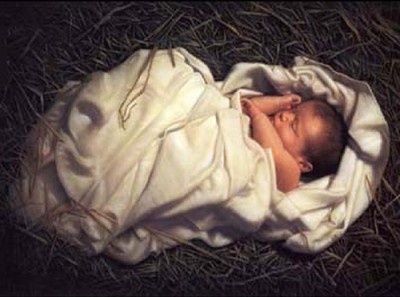 Last week baby news came at warp speed:
Last week baby news came at warp speed:
Mark Zuckerberg, the creator of Facebook and a multi-billionaire, had a baby daughter, Max. In honor of her birth he and his wife established a non-profit fund of 45 billion dollars, to advance human potential and promote equality.
Two days later, San Bernardino shooters Syed Farook and his wife Tashfeen Malik intentionally orphaned their baby daughter, who is now in child protective custody without a penny to her unpublished name.
All this, in the first week of Advent, when Christians begin their 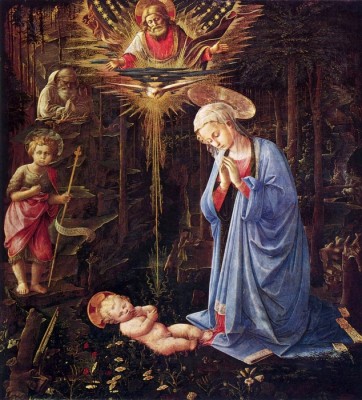 annual trek to the manger in Bethlehem, to find Mary’s Babe asleep on the hay. The road to the manger winds through the story of John the Baptist, Jesus’ second cousin (according to Luke), who was born a few months before him, and who could have been his playmate, as medieval paintings liked to show. But that is not relevant in Advent, where John is eternally our adult guide, his story read for two or even three of the four Advent Sundays. More than any other, he prepares us for the Christ Child.
annual trek to the manger in Bethlehem, to find Mary’s Babe asleep on the hay. The road to the manger winds through the story of John the Baptist, Jesus’ second cousin (according to Luke), who was born a few months before him, and who could have been his playmate, as medieval paintings liked to show. But that is not relevant in Advent, where John is eternally our adult guide, his story read for two or even three of the four Advent Sundays. More than any other, he prepares us for the Christ Child.
![]() John, aka The Forerunner, was a powerful desert preacher who drew crowds and angered the authorities with his inflammatory rhetoric. The way to the Manger has always been through his rhetoric. But this year, we are stumbling by Baby Zuckerberg and Baby Farook, who are also part of our forerunning. And they aren’t the only babies in our line of sight: the babies of Syrian refugees have been much debated recently, whether we should find room for them in the Inn of our world, or not.
John, aka The Forerunner, was a powerful desert preacher who drew crowds and angered the authorities with his inflammatory rhetoric. The way to the Manger has always been through his rhetoric. But this year, we are stumbling by Baby Zuckerberg and Baby Farook, who are also part of our forerunning. And they aren’t the only babies in our line of sight: the babies of Syrian refugees have been much debated recently, whether we should find room for them in the Inn of our world, or not.
All these babies make John’s challenging line about children particularly relevant: “You brood of vipers! Who warned you to flee from the wrath to come? Bear fruits worthy of repentance. Do not begin to say to yourselves, ‘We have Abraham as our ancestor’; for I tell you, God is able from these stones to raise up children to Abraham.” (3:7-8)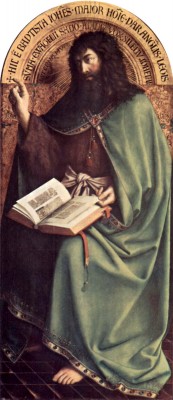
It’s hard, at least for me, to get past being called a brood of vipers. And beyond that hurdle are more hard words: the wrath to come. My attention and my goodwill stop at this kind of talk. So the part about God raising up children from stones – in other words, replacements for us all – can often get overlooked. But this year, John’s question has special relevance. When you take out the hyperbole and the cursing, the question is: What are human children worth, in faith, in decent life, as part of humanity? What are they worth, to God and to us?
John chastises his hearers for favoritism and separatism, for letting some suffer and starve while others are coddled. The film Spotlight tells a similar tale, recounting the Boston Globe’s investigation of child sexual abuse by Catholic priests, and their discovery that priestly child abuse had been known and covered up for 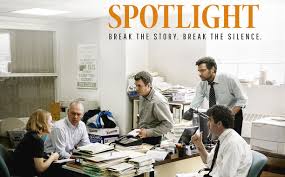 years. Great pressure was brought to bear upon the Globe to keep this story out of the press. The reporters knew the real story was not about individual priests, but about the whole system that hid this behavior and never tried to root it out, allowing great suffering to happen to an untold number of poor children in its institutional care.
years. Great pressure was brought to bear upon the Globe to keep this story out of the press. The reporters knew the real story was not about individual priests, but about the whole system that hid this behavior and never tried to root it out, allowing great suffering to happen to an untold number of poor children in its institutional care.
In one scene Mitchell Garabedian, the lawyer for the victims, said to a reporter: If it is true that it takes a village to raise a child, then it is also true that it takes a village to abuse a child.
And the reporters found he was right. Everyone, from parochial school administrators, and courthouse clerks, to other lawyers who had represented victims, and even up to and including Cardinal Law, had been active in the cover up. Even the Globe itself had ignored information that had come its way over the years.
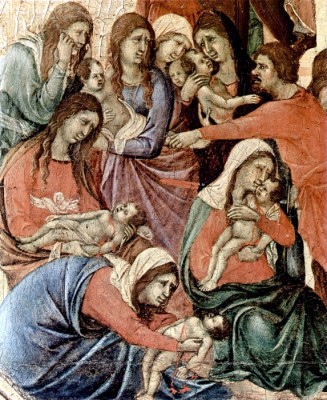 We’ve got politicians now, shouting that we must close our doors to suffering children who are refugees, in the name of national security, and governors saying they cannot keep them safe and do not want them. What’s parallel is the choice to sacrifice the welfare of children for the safety of an adult world.
We’ve got politicians now, shouting that we must close our doors to suffering children who are refugees, in the name of national security, and governors saying they cannot keep them safe and do not want them. What’s parallel is the choice to sacrifice the welfare of children for the safety of an adult world.
The Advent trek to Christmas contains such a tale, of Herod the king who feared the Child in the straw and sent soldiers to kill the children under two in Bethlehem, to secure the safety of his throne for himself and his own child.
Will the billionaire’s child save us from the dark side of ourselves that sees poor children as disposable? The British paper The Guardian suggests that such philanthropies as Mark Zuckerberg is setting up increase capital for the wealthy who run them, in the name of the poor whom they do not actually help.
John, the Voice in the Wilderness, each year decries the economy of competition, and the economy of branding, which takes care of its own at the expense of the weaker, the poorer; John preaches an economy of meeting one another’s needs. So this is Christmas: not wish lists, but sharing the basics, in the name of a Baby who had nothing.
All poor men and humble, all lame men who stumble, come haste ye, and feel not afraid. For Jesus, our treasure, with love past all measure, in lowly poor manger was laid. – traditional Welsh carol.
______________________________________________________________________________________
Illustrations:
1. Babe in Manger. by Gina Carter. Catholic Devotional website.
2. Nativity, by Fra Filippo Lippi. 1459. Berlin, Germany. Vanderbilt Divinity school Library, Art in the Christian Tradition.
3. Russian Orthodox Icon of John the Baptist, from an unrestricted Orthodox website.
4. John the Baptist, Altar of the Mystical Lamb. by Jan van Eyck, 1426. Ghent, Belgium. Vanderbilt Divinity School Library, Art in the Christian Tradition.
5. Spotlight film poster.
6. Bethlehem Mourns Infants Killed by Herod. Duccio di Buoninsegna, 1306, Maesta Altar, Siena, Italy. Vanderbilt Divinity School Library, Art in the Christian Tradition.









